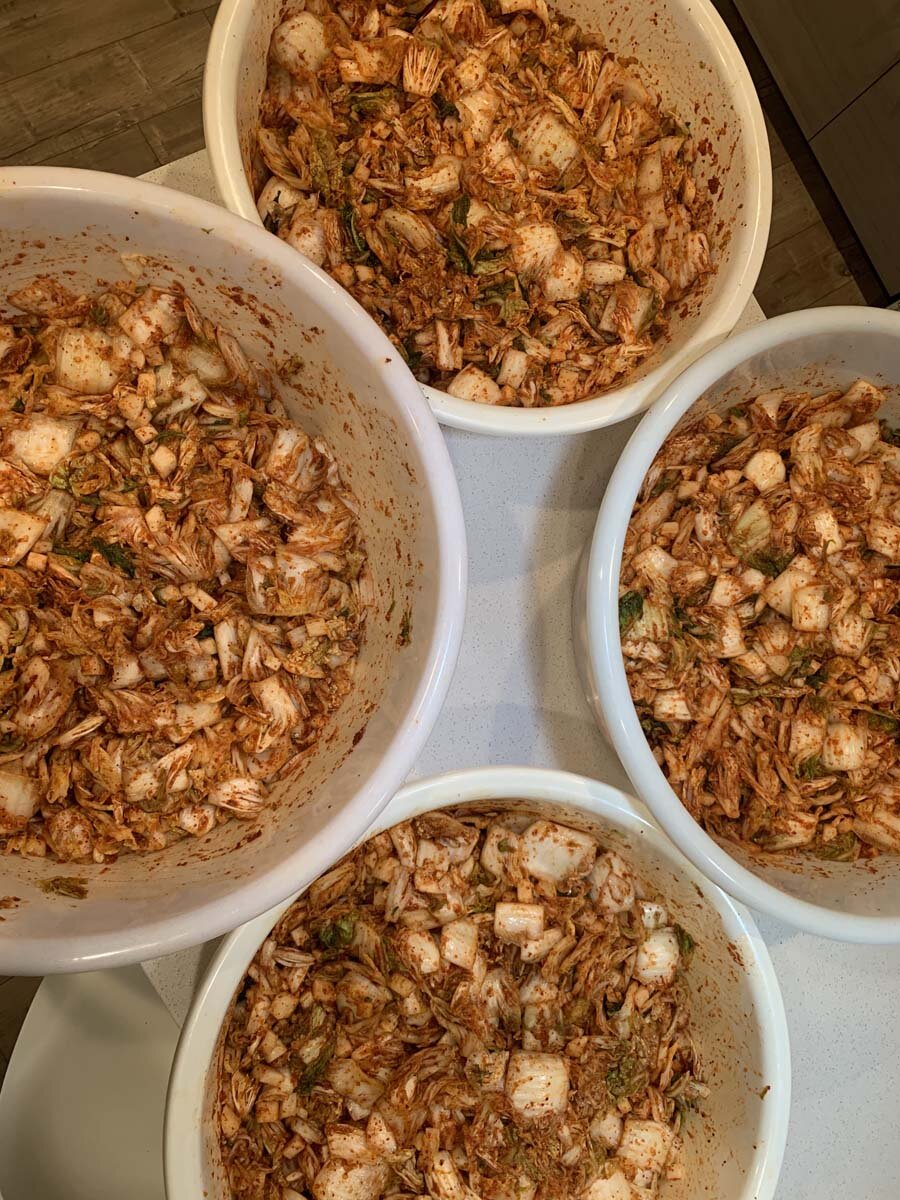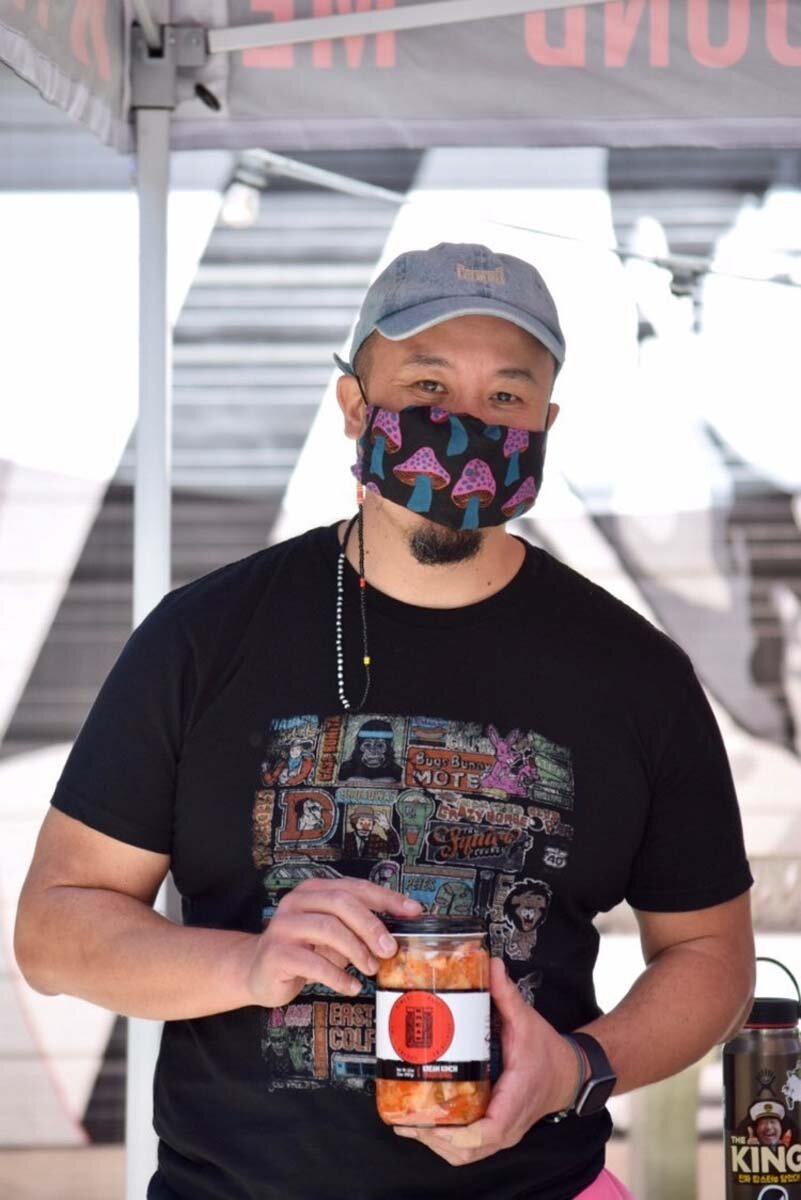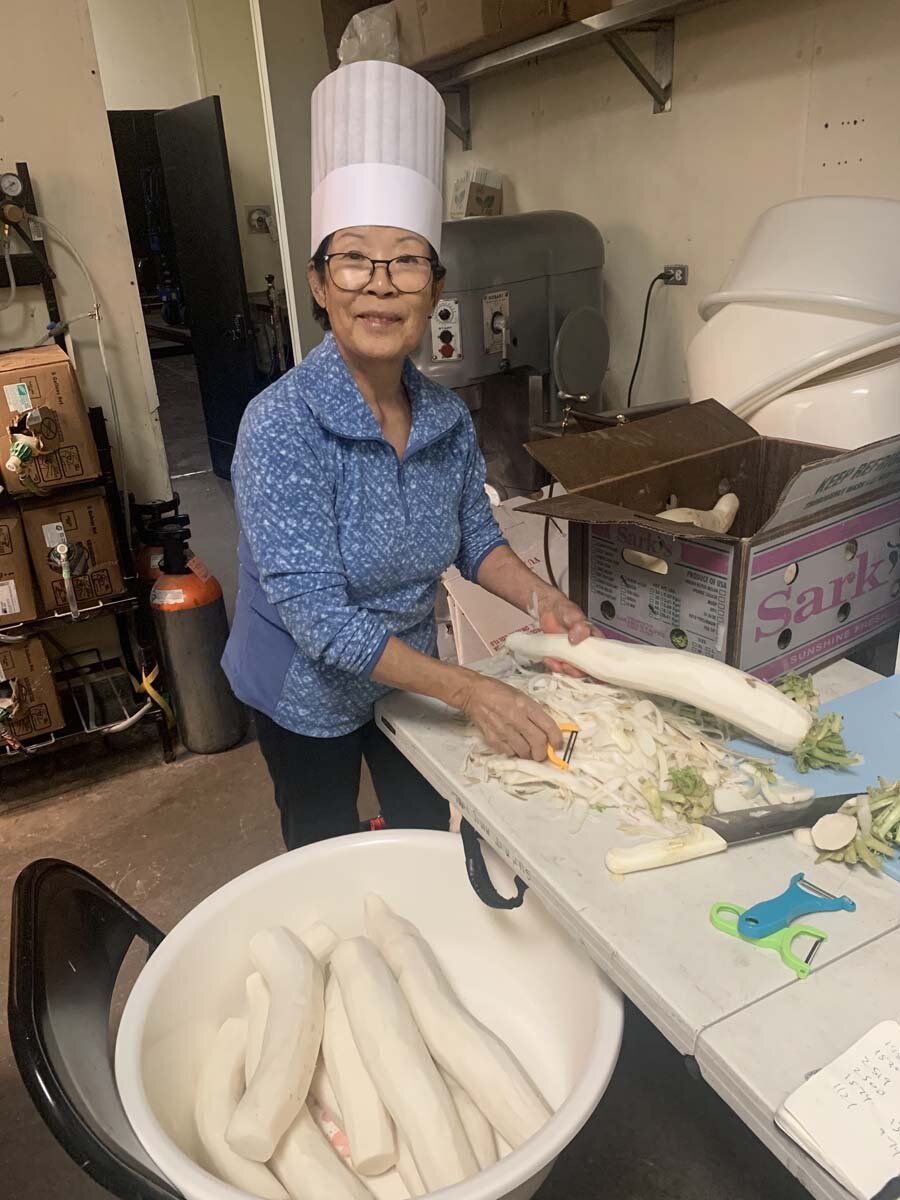K.R.E.A.M. Kimchi is a side-dish side-hustle that blossomed into a beloved Colorado company

COLORADO SPRINGS, Colo. — Startup culinary company K.R.E.A.M. Kimchi welcomed its first employee heading into month four of operations as a pandemic-era pivot.
The sole applicant has decades of first-hand experience, a passion for food — and a tie to the cause.
She's the founder’s own mother, Chae Dickerson.
“She’s so cute in her chef’s hat,” said her son, Virgil Dickerson, owner and founder of K.R.E.A.M. Konsulting and its offshoot K.R.E.A.M. Kimchi brand.
Before you call nepotism, consider these origins — the kimchi recipe creating happy bellies across Colorado is one of his mother’s own.
Kimchi, a traditional, nutrient-dense Korean side dish, is made by fermenting cabbage and other vegetables. The result is a crunchy, tangy, spicy addition to practically any meal.
“K.R.E.A.M. stands for ‘Kimchi Rules Everything Around Me.’ It’s a nod to the Wu-Tang song C.R.E.A.M., which stands for ‘Cash Rules Everything Around Me,’” Virgil said. “When I started this business, I wanted to give a nod to the hip-hop that I love, but also to my Korean culture.”
Born and raised in Korea, Virgil’s mother met his father, an American soldier, while he was stationed in Seoul. Shortly after Virgil’s birth in 1975, the young family emigrated from Korea to the United States. They moved south of Colorado Springs, to Fountain, positioned near the Army base of Fort Carson.
“It was really hard,” Chae said. For years, she deeply missed her family and Korea.
“There weren’t a lot of Korean Americans in our neighborhood,” Virgil said. “I grew up unsure of my identity.”
At an early age, when he had difficulty with English pronunciation, Virgil’s parents made the decision to stop teaching him Korean. Struggling to maintain his Asian heritage alongside the American dream, Virgil was slow to embrace traditional homemade Korean foods. In a world of ready-made, processed American fare, he acclimated to Kimchi as an acquired taste — but only as an adult.
“As a kid, I didn’t love Kimchi,” Virgil said. “I thought it was gross.”
“Growing up Korean-American, but wanting to be American-American, I just wanted to eat Totino’s pizza rolls, Chef Boiardi microwaved spaghetti, and Sizzlean. I feel like we ate Kraft Mac and Cheese at every dinner,” he said.
His father, originally from Indiana, also influenced family meals by requesting his own childhood favorites. “We were eating biscuits and gravy and fried bologna,” Virgil said. “But then we were also eating traditional Korean dishes, like Bulgogi and Kahl Bi. We had a clash of food cultures.”
Wanting her sons to experience traditional Korean foods — and also wanting them to eat what she cooked — Chae sometimes created hybrid meals.
“My mom would make a dish called Kimchi-jjigae, which is kind of a kimchi stew,” Virgil said. “It typically has beef or pork. But for us, she made it with bacon and hot dogs. As American kids, we loved the bacon and hot dogs,” he remembers. “We loved the spice that the kimchi brought on, but we’d push all the kimchi to the side. It wasn’t until years later that I fell in love with kimchi.”

“Most Koreans, when they leave home, the first thing they miss is kimchi and rice,” Chae said.
“It’s a comfort food, for sure,” said Virgil.
Virgil remembers his mom’s cooking extending to feeding his friends and even neighborhood kids.
“They were eating stuff they’d never had before, but man, they loved it,” he said.
It’s a tradition he continues.
“That’s how he is, too, with my friends,” said Logan, Virgil’s 14-year-old son. “They’ll come over, and he cooks all this food. A lot of it is stuff they haven’t had before.”
Food has maintained a center of the family sphere.
“To this day, my mom always wants to make sure that we have plenty of food. It’s kind of like My Big Fat Greek Wedding. She asks, ‘Are you hungry?’ I say, ‘No.’ She says, ‘Okay, I’ll go make you something,’” Virgil laughs. “But I think it’s because, growing up in Korea, there were periods of time when people were starving.”
In the 1950s, the Korean War ravaged Chae’s native land.
“We had a really hard time to grow up,” his mother remembers. “Lots of times, we barely had any food. And we never had this variety.”
The caretaking impulse of motherhood led to an unintentional secrecy of traditional family recipes, Virgil said, creating an atmosphere that still makes it somewhat difficult for him to glean traditional family recipes.
“When I’m like, ‘Mom, I want to learn how to make this,’ I think she hears, ‘My son needs food!’ And then she just makes a bunch of food!” Virgil laughs.
“A couple weeks ago, I told her I’d like to learn how to make a few dishes. And by the time I got here, she’d made everything already!” he said, exasperated. Love shines through his voice as he turns to his giggling mother. “Mom, how am I going to learn how to make things if you make them before I get here?”
Another roadblock is the memorized, instinctive nature of traditional recipes, versus written ingredients lists and instructions.
“A lot of grandmothers have their recipes in their heads. They’ve been making them for so long that everything is kind of to-taste,” Virgil said.
He finally sat down with his mother to record her kimchi recipe five years ago — and it took a concentrated effort.
“Everything she threw in the bowl, I caught, measured, wrote down, and took photos of,” he said. “And then I turned it into a recipe.”
It’s the same recipe he uses today — selling over 1,000 jars his first month in business.
Times is rough and tough like leather
K.R.E.A.M. Kimchi was born of demand — and a desire to spread the love.
In 2019, Virgil, a one-time record label owner and music promoter, began a marketing and consulting business he dubbed K.R.E.A.M. Konsulting.
“Then this thing called the Coronavirus happened and changed a lot of things for a lot of people — including myself,” he said.
At the start of the pandemic, Virgil maintained three regional marketing jobs — but work had slowed considerably.
The chaotic flurry and simultaneous eerie lull of pandemic fog called for stability. Virgil began making small-batch kimchi for friends to center himself, fill his time, and offer connection during uncertainty.
“A lot of my friends were suffering and having a hard time, and I said, ‘You know, I’m going to share a little love,’” Virgil said.
Encouraged by Logan, Virgil began delivering jars of his mom’s kimchi recipe to friends — primarily by bike. The brief, masked encounters with pals quickly became a critical element of relatedness during pandemic isolation.
“A lot of people, I just dropped their jar off on their porch. Others I was able to see briefly at a distance,” Virgil said. “Being able to talk to somebody for two minutes with our masks on made me feel like life was kind of normal for a short time. I got a lot out of that.”
After posting photos on social media of jars of kimchi waiting on friend’s porches, Virgil immediately began receiving requests.
“Everybody said, ‘What about my kimchi?’ Even strangers started reaching out to me. I said yes to everybody who asked.”
Over the course of four months, Virgil gave away over 500 jars of kimchi.
“People were so excited,” he said. “They were cooking with it and taking photos of it.”
As more people prepared meals during the “safer-at-home” public health recommendation, the jars of kimchi offered a variety of uses — as a side dish, prepared in recipes with other foods, and straight out of the jar. An added bonus: it’s good for you. Kimchi boasts increased intestinal health, anti-inflammatory and immune-boosting properties, and contributes to lower blood pressure.
Though he was offered money in exchange for his kimchi, Virgil refused.
“But people still felt inclined to give me something. And so, we bartered,” he said. “And I got some of the craziest things! I have two bikes in my garage because of jars of kimchi. I got an hour-long massage for a jar of kimchi!”
He received baked goods, dinner, art, and so much beer that his beer fridge — a normal sized fridge, he emphasizes — couldn’t hold any more. “I had cases of beer outside of that fridge,” he said. “People are just so generous. It felt amazing. It was a beautiful thing.”
“It was so much fun to see what he’d bring home,” Logan said. “Desserts, pies. One of the bikes, I even ride now!”
The Great Kimchi Giveaway of 2020 was a spirit-lifting success. So much so that when friends, family, and strangers-turned-friends hit the bottom of their jar, they clamored for more.

The result? On August 8 — his 45th birthday — Virgil officially opened shop.
“I would never in a million years have guessed that I would start a kimchi business,” he said. “Had there not been a pandemic, I don’t know that I would have ever done this. I still can’t believe it.”
Virgil has sliced through thousands of pounds of napa cabbage this year. As a fermented food, the kimchi process is critical.
“I chop and salt the cabbage, and get it kind of crisp, and take a lot of the liquid out,” he said. “I rinse it, and then I put in a combination of garlic, ginger, green onion, yellow onion, and Korean chili flake.”
He carries vegan and traditional styles.
“With the vegan I put red miso paste, and the traditional I use fermented shrimp,” he said.
It’s a labor of love.
“Kimchi already is a pretty laboring and long process, because it needs to ferment. Plus, I’m washing the jars, putting stickers on the jars, writing on the labels, filling the jars, closing them up, and boxing them. There’s definitely a lot of work and a lot of love that goes into all of that.”
Even so, he doesn’t hesitate to add extra personalized touches.
“I always write down on the jar what I’m listening to,” he said. “So, it will say the date that I jarred it, and what music I had playing. Food and music are things that I love, and when I share that love, it feels so good.”
And carrying on a family tradition feels extra good, Virgil said.
“It’s been great because this is something my mom showed me. It’s something that is part of our culture,” Virgil said. “I’m so thankful to be able to do this with her. Being able to share this with Logan has been something that has made me even more proud of being Korean.”
Growing up a person of color in the 70s and 80s, “you’d watch a movie or a TV show, and most Asians were caricatures of actual Asian people,” Virgil said. “They were things you would laugh at, not things you would look up to. Bruce Lee was the only example of an Asian person that was a role model that I could look up to.”
Today, “you’ve got people like David Chang and Eddie Huang, and you’ve got really strong, positive Asian role models, which I’m really thankful for,” he said. “Because Logan sees those things and knows it’s okay to be proud of his culture and his identity.”
“And I’m so proud of my dad,” Logan said.
Virgil sells kimchi to Coloradans for pickup or delivery at KREAMKimchi.com, where he also posts recipes and offers kimchi swag. He sets up his wares under a tent at Denver and Fort Collins markets, maintains local bike delivery, and carries extra jars to drop each time he visits his mother in Colorado Springs. He’s currently scheduling pop-up events at his favorite wineries, breweries, distilleries, bars, and restaurants.
“It’s just blowing me away that people are loving the kimchi, and how much people are cooking with it,” he said. “It just feels so good. I’m making something that people wanted nothing to do with when I was little. And I sell at these markets, and people will stop in their tracks and say, ‘Kimchi? I love Kimchi!’ They are words I never thought I’d hear.”
Virgil encourages those around him to seek their passions.
“I think there are a lot of people out there who have hobbies or maybe side hustles, and they’ve been reluctant to take that first step and actually turn it into a business,” he said. “I think a lot of us have worked jobs where we haven’t felt appreciated, and we’ve had to stay there because we have to pay our bills. A lot of those people became unemployed and have time on their hands to maybe figure out a way to turn that side hustle into a business.”
This year, Virgil and friends also created NT MRKT, a series of pop-ups featuring street food and local makers. Inspired by Asian night markets, these events “feature mostly companies owned by people of color and women,” Virgil said. “It’s been amazing. We’re building this really cool community of people who lost their jobs and who were forced to figure out another thing to do. It’s often something that they’ve always wanted to do, and they saw this time as an opportunity.”
“I think everyone should go for it!” He said. “There are a lot of things going on in this world that we don’t have control over. But if you share what you love with the people you care about and with your community, you can have an impact.”
Man with a dream with plans to make K.R.E.A.M.
On a warm fall Colorado night, three generations of Korean cooks prepare a feast in Chae’s kitchen in Colorado Springs.
“My mom is such a great cook,” Virgil raves. “She can make pretty much anything, in addition to Korean food.”

Chae has been working at The Broadmoor’s La Taverne Kitchen in Colorado Springs as a cook for over 40 years.
When she started at The Broadmoor, “I didn’t know the difference between whole wheat and white bread,” Chae laughs. “I didn’t speak any English.”
She said she watched a lot of cooking shows on TV to get the hang of it.
“This was a long time ago. Not like today,” she said. “Now, most kids finish culinary school and then come in. At that time, you’d go fill out an application and go in to work the next day. They would train you.”
Her grandson Logan, a wise-demeanored teenager with great compassion and awareness, also follows in the family footsteps, cooking family meals and often acting as his father’s right-hand assistant.
“We love to cook for people,” Virgil said. “It’s kind of my love language. Because I saw my mom do that. She’ll make so much food for four or five people! And I’m guilty of that, too.”
“It’s awesome, because we always have leftovers,” said Logan.
The trio laughs.
“Do you think this is crazy that I have a Kimchi business, and I’ve been making Korean food for a living?” Virgil teases his mom.
“Yeah!” Chae exclaims. “I would never dream about it in a million years.”
“You’ve been my inspiration,” Virgil told her. “You work harder than anybody I know, and you give so much of yourself to everybody that you care about. I feel like all of my best qualities, I got from you.”
Before the three settled at the table to eat, Virgil offered limitless praise for how his mother has inspired him.
“My mom’s story, and how hard she works — I am so lucky to be able to have witnessed that,” he said. “I learned that if you work hard, good things can happen.”
They turned to each other.
“You’re the best, mom,” said Virgil.
“No — you’re the best,” she said.
Instagram: @kreamkimchico